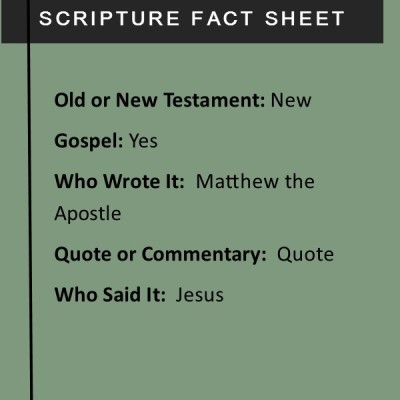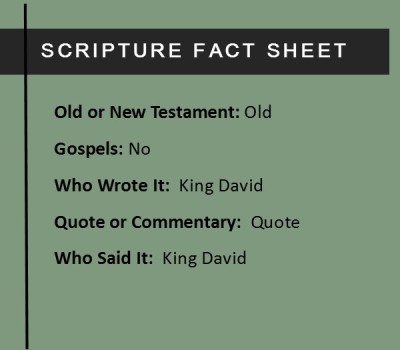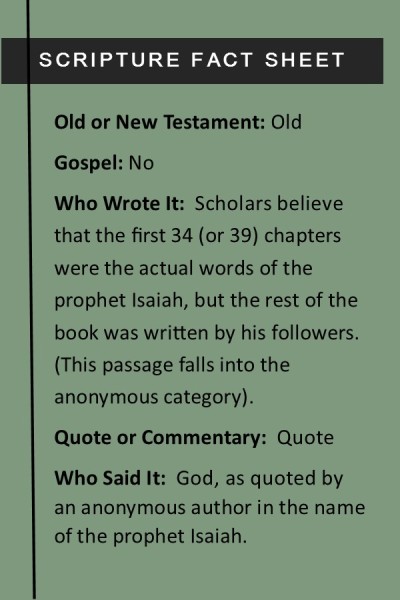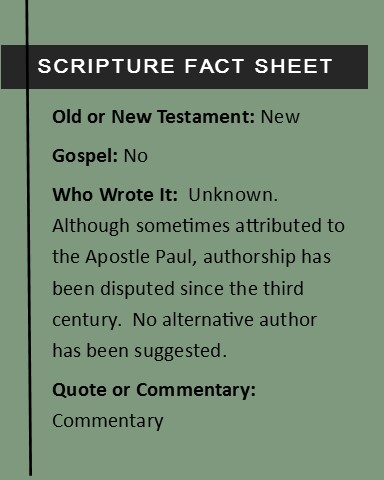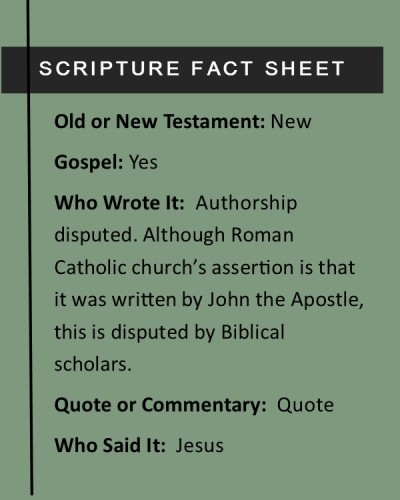Matthew 22:37: Jesus answered, “‘Love the Lord your God with all your heart, with all your soul, and with all your mind.’
Here’s the whole story:
When the Pharisees heard that Jesus had silenced the Sadducees, they came together, and one of them, a teacher of the Law, tried to trap him with a question. “Teacher,” he asked, “which is the greatest commandment in the Law?” Jesus answered, “‘Love the Lord your God with all your heart, with all your soul, and with all your mind.’ This is the greatest and the most important commandment. The second most important commandment is like it: ‘Love your neighbor as you love yourself.’ The whole Law of Moses and the teachings of the prophets depend on these two commandments.” (Matthew 22:34-40).
This is what is known is “The Great Commandment” – loving God and loving one another. And loving God is “the greatest and most important commandment” of all.
Jesus is being quoted here, but the Bible is full of contradictions and inconsistencies. When I’m doing Bible study I understand that I need to use discernment if I want to feel comfortable that I’m on the right path, that I’m really following Jesus. So is “The Great Commandment” consistent with the other teachings of Jesus? Does it make sense that he would make this statement? Is it possible that this was an invention of Matthew? Is so, is it a good invention inspired by God, or is it a jarring inconsistency? How much weight should I give this scripture? How important is it?
When I’m weighing and evaluating individual scriptures I rely a lot on my gut. I’ve read the Bible cover to cover many times and some scriptures just feel “right” and others feel “not as right” to me. I take this into account, because I ultimately have to rely on the leading of the Holy Spirit to enlighten me as I study scripture. It’s a prayerful experience. However, I also use an objective methodology that I’ll share here. As in this case, I ask a series of questions, and do a little research to test the scripture.
Is it consistent with Jewish Law?
The answer is yes. Loving God is mentioned many times in the Torah, especially the Book of Deuteronomy:
- Love the Lord your God with all your heart, with all your soul, and with all your strength. (Deuteronomy 6:5).
- Remember that the Lord your God is the only God and that he is faithful. He will keep his covenant and show his constant love to a thousand generations of those who love him and obey his commands, but he will not hesitate to punish those who hate him. (Deuteronomy 7:9-10).
- Now, people of Israel, listen to what theLord your God demands of you: Worship the Lord and do all that he commands. Love him, serve him with all your heart, and obey all his laws. I am giving them to you today for benefit. (Deuteronomy 10:12-13).
- Love the Lord your God and always obey all his laws. (Deuteronomy 11:1).
- So then, obey the commands that I have given you today; love the Lord your God and serve him with all your heart. (Deuteronomy 11:13).
- Obey faithfully everything that I have commanded you: Love the LORD your God, do everything he commands, and be faithful to him. (Deuteronomy 11:22).
- Prophets or interpreters of dreams may promise a miracle or a wonder,in order to lead you to worship and serve gods that you have not worshiped before. Even if what they promise comes true, do not pay any attention to them. The Lord your God is using them to test you, to see if you love the Lord with all your heart. (Deuteronomy 13:1-3).
- The Lord your God will give you and your descendants obedient hearts, so that you will love him with all your heart, and you will continue to live in that land. (Deuteronomy 30:6).
- If you obey the commands of the Lord your God, which I give you today, if you love him, obey him, and keep all his laws, then you will prosper and become a nation of many people. The Lord your God will bless you in the land that you are about to occupy. (Deuteronomy 30:16).
- Love the Lord your God, obey him and be faithful to him, and then you and your descendants will live long in the land that he promised to give your ancestors, Abraham, Isaac, and Jacob.” (Deuteronomy 30:20).
Is it consistent with the teachings of the prophets?
Yes, the prophets continue to emphasize that God wants humanity to love him. They warned that God wanted emotional involvement, not just obedience to the laws.
- The Lord said, “These people claim to worship me, but their words are meaningless, and their hearts are somewhere else. Their religion is nothing but human rules and traditions, which they have simply memorized. (Isaiah 29:13).
- I will give them the desire to know that I am the Lord. Then they will be my people, and I will be their God, because they will return to me with all their heart. (Jeremiah 24:7)
- You will seek me, and you will find me because you will seek me with all your heart. (Jeremiah 29:13)
- The new covenant that I will make with the people of Israel will be this: I will put my law within them and write it on their heart I will be their God, and they will be my people. (Jeremiah 31:33).
Is it part of Jewish tradition?
The importance of loving God is deeply rooted in Jewish consciousness. It is part of what they call the Shema, the oldest fixed daily prayer in Judaism. As a Jew, Jesus would have recited this prayer morning and evening, and it is still recited by Jews today. This part of the Shema is based these words from Deuteronomy 6:4-9:
“Israel, remember this! The Lord—and the Lord alone—is our God. Love the Lord your God with all your heart, with all your soul, and with all your strength. Never forget these commands that I am giving you today. Teach them to your children. Repeat them when you are at home and when you are away, when you are resting and when you are working. Tie them on your arms and wear them on your foreheads as a reminder. Write them on the doorposts of your houses and on your gates.”
Is this scripture found in all of the Gospels?
It is found in all of the Synoptic Gospels – in addition to Matthew, this scripture also appears twice in Mark and once in Luke. It does not appear in the Book of John.
- Love the Lord your God with all your heart, with all your soul, with all your mind, and with all your strength.’ (Mark 12:30)
- And you must love God with all your heart and with all your mind and with all your strength; and you must love your neighbor as you love It is more important to obey these two commandments than to offer on the altar animals and other sacrifices to God.” (Mark 12:33).
- A teacher of the Law came up and tried to trap Jesus. “Teacher,” he asked, “what must I do to receive eternal life?” Jesus answered him, “What do the Scriptures say? How do you interpret them?” The man answered, “‘Love the Lord your God with all your heart, with all your soul, with all your strength, and with all your mind’; and ‘Love your neighbor as you love yourself.’” “You are right,” Jesus replied; “do this and you will live.” (Luke 10:25-28).
Is it consistent with Jesus’ actions and the rest of his teachings?
Jesus didn’t talk a lot about his love for God, but he demonstrated his total devotion to God through his actions. He gave up everything – home, family, stability, safety, comfort, money, etc. – in his commitment to God. He gave up all possibility of a normal life to be in ministry. From the time that he was baptized he was all in – heart, soul, and mind. In the wilderness Satan offered Jesus the whole world if he would turn his back on God and worship him, and Jesus replied, “Go away, Satan! The scripture says, ‘Worship the Lord your God and serve only him!’”
Jesus’ relationship with God was a very personal one, evidenced by the fact that he referred to God as his “Father” and encouraged everyone else to do likewise. A healthy father/son relationship isn’t based on legalism. It’s emotional. It’s grounded in love. And when he ultimately chooses at Gethsemane to submit to die on the cross at the hands of the Romans and religious authorities, I interpret it as an act of love for God.
Finally, in his ongoing critique of the Pharisees he points out that the Law isn’t as important as love:
- “You hypocrites! How right Isaiah was when he prophesied about you! These people, says God, honor me with their words, but their heart is really far away from me. It is no use for them to worship me, because they teach human rules as though they were my laws!’” (Matthew 15:7-9)
- “How terrible for you Pharisees! You give to God one tenth of the seasoning herbs, such as mint and rue and all the other herbs, but you neglect justice and love for God. These you should practice, without neglecting the others. (Luke 11:42)
- But I know what kind of people you are, and I know that you have no love for God in your heart (John 5:42)
Is it carried over into the rest of the New Testament (the Epistles)?
Not really. Believe it or not there are only two references to loving God in the letters of the apostles. Once you get past the Gospels (first four books of the Old Testament), there are only two references to loving God:
- We know that in all things God works for good with those who love him, those whom he has called according to his purpose. (Romans 8:28)
- But the person who loves God is known by him. (1 Corinthians 8:3)
Only 2 references, compared to more than 50 references in the letters about God’s love for us as revealed by the sacrificial death of Christ. After the Gospels, the theological emphasis changes from the importance of loving and serving God to the importance God’s love for us and his sacrifice laid at our feet. The emphasis is on receiving love rather than extending it.
Maybe the writers of the Epistles just went a little overboard. In the Old Testament, God’s love was conditional; it was dependent on obedience to Jewish law. Later on the prophet Jeremiah predicted a new relationship between God and humanity:
The new covenant that I will make with the people of Israel will be this: I will put my law within them and write it on their hearts. I will be their God, and they will be my people. None of them will have to teach a neighbor to know the Lord, because all will know me, from the least to the greatest. I will forgive their sins and I will no longer remember their wrongs. (Jeremiah 31:33-34)
Jesus went a step further. He said that God loves even the outcasts and non-Jews. I guess the writers of the Epistles were so excited about the expansive love that flows from the heart of God that they didn’t feel the need to remind folks that Jesus said that loving God was the most important commandment. But then again, unlike the Gospels, the Epistles weren’t intended to be definitive, universal theological treatises. They were letters to particular groups of people, addressing very specific issues and concerns at a given point in time. Probably all of the people they were writing to were extravagant God-lovers so it wasn’t an issue. But sometimes it seems like we have to go a little too far to the right, and then a little too far to the left, then back and forth a few times before we get it right and hit the right balance.
Summary
Back to the scripture: “Love the Lord your God with all your heart, with all your soul, and with all your mind.”(Matthew 22:37).
I think the Great Commandment (of which this scripture is a part) is perhaps the most important of Jesus’ teachings. I guess others throughout church history agree, which is why they call it “The Great Commandment”. What’s hard to believe is that this scripture about loving God is #95 on this list of the 100 most popular scriptures. That’s not very popular. But on the bright side, at least it’s on the list, unlike loving your neighbor (the second part of “The Great Commandment”) which didn’t even make the cut.
In the Gospels, Jesus encourages a reciprocal relationship with God, where we love and are loved at the same time. Today we know that this is the hallmark of every healthy relationship. Jesus showed us how to love and honor God (by loving and serving others), and also how to receive his love and acceptance (as one receives and accepts the love of a father). In this scripture he says that this love should be extravagant – heart, soul and mind. We should love God (and neighbor) without reservation.
Loving heart, soul, and mind is risky business emotionally. It means loving God even when things don’t go your way and you feel like he’s not loving you back. Just like Jesus felt when he was on the cross. Unloved and abandoned. To me, it seems like we pretend that the Great Commandment is to receive the love of God, as opposed to giving our love to God. And then we seem to get spiritual constipation – retaining the unconditional love we receive from God rather than passing it out freely to our enemies and society’s outcasts as Jesus commanded us to do.
Anyway – I say that if you follow this scripture you are 100% following Jesus. What do you say?
Related posts by this author:
https://josusblog.wordpress.com/2013/09/13/day-59-matthew-712/
https://josusblog.wordpress.com/2013/11/07/day-114-matthew-126-8/
https://josusblog.wordpress.com/2013/08/02/day-17-matthew-517-18-part-1/
